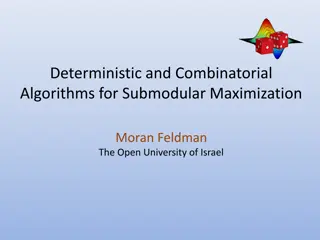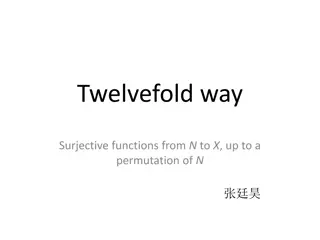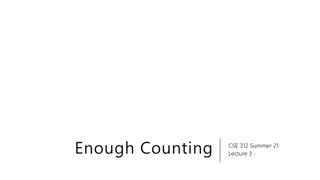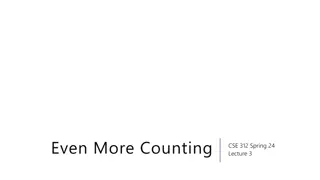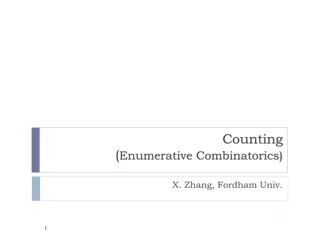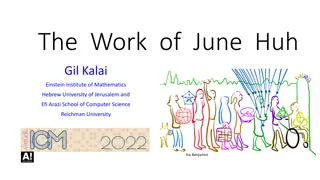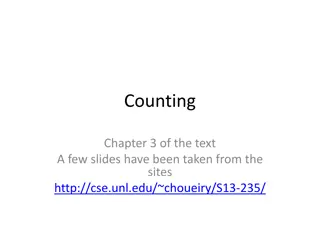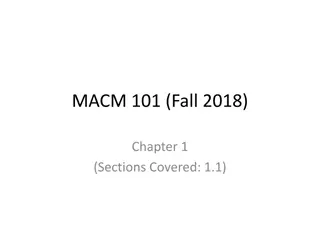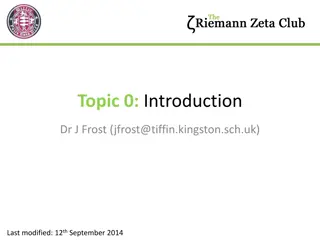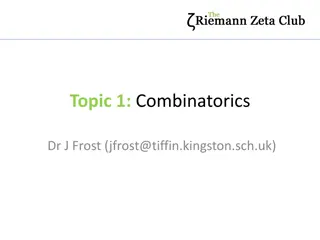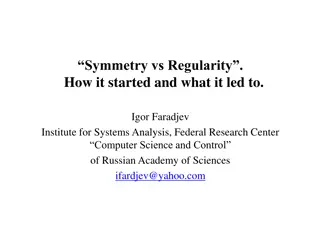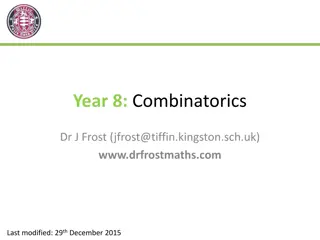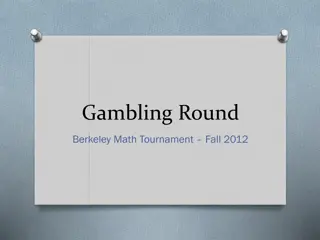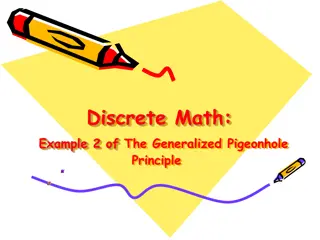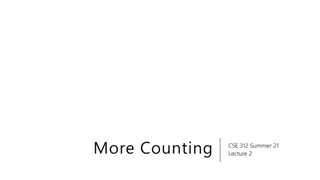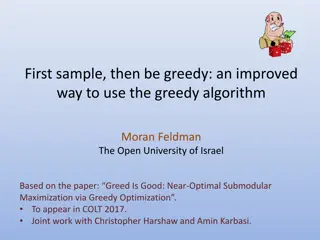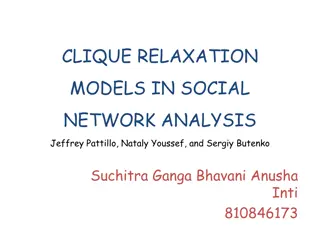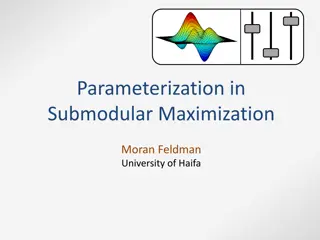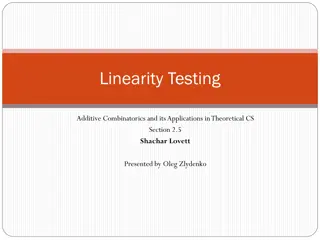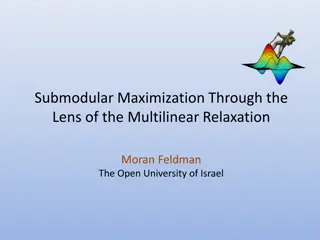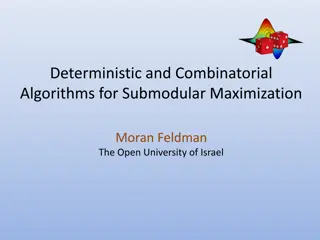Submodular Maximization Algorithms Overview
This article discusses deterministic and combinatorial algorithms for submodular maximization, focusing on their applications in various fields such as combinatorics, machine learning, image processing, and algorithmic game theory. It covers key concepts like submodularity, examples of submodular op
1 views • 25 slides
Discrete Optimization in Mathematical Modeling
Discrete Optimization is a field of applied mathematics that uses techniques from combinatorics, graph theory, linear programming, and algorithms to solve optimization problems over discrete structures. This involves creating mathematical models, defining objective functions, decision variables, and
2 views • 12 slides
Exploring the Twelvefold Way in Combinatorics
The Twelvefold Way in combinatorics classifies enumerative problems related to finite sets, focusing on functions from set N to set X under various conditions like injective or surjective. It considers equivalence relations and orbits under group actions, providing a systematic approach to counting
4 views • 15 slides
Principles of Inclusion-Exclusion in Combinatorics
Explore the principles of inclusion-exclusion in combinatorics, focusing on scenarios involving sets and intersections. Learn how to calculate the number of strings that contain specific elements by applying these principles effectively, with detailed examples and explanations.
1 views • 49 slides
Counting Techniques and Combinatorics Overview
Explanation of counting principles in combinatorics including permutations, combinations, binomial theorem, and overcounting scenarios with examples like anagrams. Also covers important facts and rules related to combinations. Highlights the importance of starting homework early and accessing option
0 views • 35 slides
Counting Strategies and Examples in Enumerative Combinatorics
Understanding counting principles in enumerative combinatorics is essential for solving mathematical problems involving permutations and combinations. The concepts discussed include calculating probabilities, determining the number of outcomes, and applying counting rules to various scenarios such a
1 views • 69 slides
Additive Combinatorics Approach to Log-Rank Conjecture in Communication Complexity
This research explores an additive combinatorics approach to the log-rank conjecture in communication complexity, addressing the maximum total bits sent on worst-case inputs and known bounds. It discusses the Polynomial Freiman-Ruzsa Conjecture and Approximate Duality, highlighting technical contrib
0 views • 9 slides
Insights into Graph Colorings, Chromatic Polynomials, and Conjectures in Discrete Geometry
Delve into the fascinating world of graph colorings, chromatic polynomials, and notable conjectures in discrete geometry. Explore the impact of June Huh in bringing Hodge theory to combinatorics and his proof of various mathematical conjectures. Uncover the significance of the four-color theorem, co
0 views • 17 slides
Combinatorics and Counting in Mathematics
An exploration into combinatorics, focusing on arranging objects and counting possibilities. From dividing polygons to listing objects, delve into the world of counting and arrangement. Learn how counting plays a vital role in algorithms and probability, and discover the complexity it adds to variou
1 views • 117 slides
Review of Common Algorithms and Probability in Computer Science
Exploring common quicksort implementations, algorithms with probabilities of failure, and small probabilities of failure in computer science. The content covers concepts like combinatorics, probability, continuous probability, and their applications in computer science and machine learning. Strategi
1 views • 15 slides
Combinatorics in Discrete Mathematics
Combinatorics, a key facet of discrete mathematics, explores the arrangement of objects and finds applications in various fields like discrete probability and algorithm analysis. The Rule of Sum, a fundamental principle, dictates how tasks can be accomplished when they cannot be done simultaneously.
0 views • 70 slides
Senior Maths Club Information Overview
Dr. J.Frost introduces the Senior Maths Club, catering to those interested in challenging math beyond A-level curriculum and preparing for competitions like the SMC and BMO. The club offers a broad grounding in math for university interviews, focusing on topics like number theory, combinatorics, and
0 views • 28 slides
Combinatorics Fundamentals with Dr. J. Frost
Delve into the realm of combinatorics with Dr. J. Frost as your guide. Discover key topics like slot filling, factorial and permutation functions, distinguishable vs. indistinguishable objects, recurrence relations, compositions, and partitions. Uncover the art of counting and arranging objects with
1 views • 75 slides
Symmetry vs. Regularity: Origins of Algebraic Combinatorics
Igor Faradjev recounts the origin of algebraic combinatorics in the 1968-1990 period at the Institute for Systems Analysis. He reflects on his personal experiences, relationships with key mathematicians, and the innovative work undertaken in the Mathematical Laboratory of the Institute for Theoretic
0 views • 49 slides
Combinatorics in Year 8 Mathematics
Explore combinatorics concepts in Year 8 mathematics through systematic counting methods, including examples of counting right-angled triangles, frog hop sequences, and combinations of starters and main courses. Practice exercises included to enhance understanding of problem-solving strategies in co
0 views • 29 slides
Berkeley Math Tournament Fall 2012 - Problem Set Summary
The problem set from the Berkeley Math Tournament Fall 2012 includes questions on combinatorics, algebra, logic, and geometry. It challenges participants with scenarios involving coin probabilities, student major combinations, number selection games, and truth-telling puzzles. Test your problem-solv
0 views • 50 slides
Combinatorics Theorems and Examples with Practical Applications
Explanation of combinatorics theorems, such as the Division Rule and Rearranging with Duplicates, along with practical examples like counting anagrams and organizing pairs. The Pigeonhole Principle is also illustrated, showcasing applications in various scenarios with clear steps and outcomes.
1 views • 17 slides
The Generalized Pigeonhole Principle in Discrete Math
The Generalized Pigeonhole Principle is illustrated through an example involving selecting cards from a deck. By strategically grouping the cards, we determine the minimum number needed to guarantee at least three cards of the same suit are chosen. Additionally, the process is applied to finding the
1 views • 5 slides
More Counting
Announcements for CSE 312 Summer Lecture 2 with topics on permutations, combinations, and the binomial theorem. Explore sequential processes, factorial concepts, and dense questions in combinatorics. Understand the importance of order, distinct elements, and the universe of allowed elements in count
0 views • 44 slides
First sample, then be greedy: an improved way to use the greedy algorithm
An improved approach leveraging the greedy algorithm for Submodular Maximization, ensuring near-optimal results. Understand the theoretical foundations, insights, and examples of submodular functions in various domains like Combinatorics, Algorithmic Game Theory, Image Processing, and Machine Learni
0 views • 16 slides
A Unified Continuous Greedy Algorithm for Submodular Maximization
The paper discusses a unified continuous greedy algorithm for submodular maximization, exploring properties of set functions, submodular functions in combinatorics, polytope constraints, relaxation techniques, and the continuous greedy algorithm. It covers definitions, importance of submodularity, a
0 views • 17 slides
Filtered Complexes: An Increasing Sequence of Simplicial Complexes
In mathematics, a filtered complex is a sequence of simplicial complexes where each complex is a subset of the next, ordered by inclusion. Learn more about filtered complexes and their properties in this insightful article. Discover how these structures are crucial in various areas of mathematics, s
0 views • 22 slides
Submodular Maximization and Multilinear Relaxation
Submodular functions play a crucial role in various fields like combinatorics and machine learning. This overview delves into the formal definitions, optimization problems, and the application of the Multilinear Relaxation technique to tackle submodular maximization challenges.
0 views • 16 slides
Sets and Functions
This course covers essential topics in discrete structures, sets, and functions for Fall 2018. Students will explore foundational concepts and theories in discrete mathematics to build a strong understanding of sets, functions, and their applications in various fields. The course emphasizes problem-
0 views • 44 slides
Insightful Exploration into Reaction Networks and Dynamics
Delve into the fascinating world of reaction networks through "An Information Processing View of Reaction Networks." Explore concepts like Markov chains, Master Equations, and rich dynamics. Discover the surprising theorems in Dynamical Systems, Combinatorics, and Statistical Mechanics related to re
0 views • 30 slides
Submodular Maximization and Combinatorial Optimization Insights
Discover the realm of submodular maximization and combinatorial optimization through concepts such as maximum matching, Max-SAT, and interesting special cases. Understand the significance of submodularity in various fields, from economics to sensor covering. Dive into why submodular functions matter
0 views • 30 slides
Additive Combinatorics in Theoretical CS: Linearity Testing and Applications
Explore the world of linearity testing and additive combinatorics in theoretical computer science through methods such as property testing, discrete Fourier transform, and character maps. Discover how to analyze functions and data for specific properties efficiently.
0 views • 32 slides
Rules and Examples for Counting in Combinatorics
Explore basic counting rules including the sum rule, product rule, permutations, combinations, binomial coefficients, and the inclusion-exclusion principle. Learn how to calculate the number of elements in sets and understand the Cartesian product of sets. Dive into examples of counting strings and
0 views • 51 slides
Maximization Problems in Submodular Functions and Multilinear Relaxation
Explore submodular maximization problems and multilinear relaxation techniques in the context of combinatorics, machine learning, and algorithmic game theory. Learn about optimizing non-monotone functions and the challenges faced by greedy algorithms in solving more general submodular optimization t
0 views • 28 slides
Protein Sequence Combinatorics and Sequence Space Analysis
Explore the vast possibilities of protein sequences through combinatorics and sequence space analysis. Understand the theoretical limits of amino acid substitutions in a multi-dimensional sequence space scenario. Delve into the complexities of protein sequence variation and potential evolutionary pa
0 views • 10 slides
Understanding Counting Methods in Combinatorics
Explore various counting methods in combinatorics such as permutations, combinations, and the counting rule. Learn how to calculate probabilities and arrangements when ordering matters or repetition is allowed. Dive into the concept of permutation with replacement and tackle exercises to deepen your
0 views • 30 slides
Deterministic and Combinatorial Algorithms for Submodular Maximization
Explore deterministic and combinatorial algorithms for submodular maximization with examples like Max DiCut and Max k-Cover. Learn about submodular optimization and continuous relaxations in various applications such as combinatorics, machine learning, and image processing.
0 views • 25 slides
